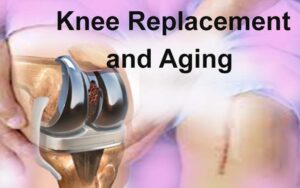FAQs on Knee Replacement and Aging: both sides of the same coin. The advanced technologies in medical sciences have paved the way to a better quality of life
A journey of 100 miles begins with a single step, and that one step is as important as time. A study shows that a moderately active person takes around 7,500 steps/day. If one maintains that daily average and lives until 80 years of age, one would have walked about 21,62,62,500 steps in a lifetime. The average person with the average stride living until 80 will walk a distance of around 110,000 miles, which is the equivalent of walking about 5 times around the Earth, right on the equator! Well, that is what our knees are capable of doing.
How complex is the knee?
The knees are one of the largest and most complex joints of the human body which joins the thigh bone (femur) to the shin bone (tibia). The smaller bone that runs alongside the tibia (fibula) and the kneecap (patella) are the other bones that make the knee joint. This complex part of the human body is necessary for all types of motor activity. The two C-shaped pieces of cartilage called the medial and lateral menisci act as shock absorbers between the femur and tibia.
Is knee problem common to all who are growing old?
As one grows in age, it is normal for the knee to get worn out due to the continuous movement of the bones. The result of this would be joint pains, difficulty in sitting and getting up, trouble in walking, etc. Sometimes due to an injury as well, the knee could be hurt, resulting in severe pain. In such cases, medical assistance is strongly recommended.


What are some of the most common knee problems?
The most common cause of chronic knee pain and disability is arthritis. Although there are many types of arthritis, most knee pain is caused by just three types: osteoarthritis, rheumatoid arthritis, and post-traumatic arthritis.
- Osteoarthritis
Osteoarthritis is a situation where the protective cartilage that cushions the ends of the bones wears down over time. This is seen in millions of people worldwide. The medical treatment that many orthopedics suggest is to go for knee replacement surgery. Of course, this comes as the last resort solution after the regular physiotherapyand medications.
- Rheumatoid arthritis.
This is a disease in which the synovial membrane that surrounds the joint becomes inflamed and thickened. This chronic inflammation can damage the cartilage and eventually cause cartilage loss, pain, and stiffness. Rheumatoid arthritis is the most common form of a group of disorders termed “inflammatory arthritis.” This disease can affect even younger individuals and involve many joints like hands and feet. It is a type ofautoimmune disease where misdirected immune cells damage our organs, for example, joints.
- Post-traumatic arthritis.
A severe knee injury causes this. Fractures of the bones surrounding the knee or tears of the knee ligaments may damage the articular cartilage over time, causing knee pain and limiting knee function.
Once discovered about the knee problem, what do I do next?
In determining whether a knee replacement is suitable for someone, an orthopedic surgeon assesses the knee’s range of motion, stability, and you may require an x ray. However, the decision for aknee replacement depends on your age, how painful is your knee, limitaions of your daily acyivities due to knee pain and your willingness to undergo a surgery.
What are some of the reasons recommended for surgery?
- Severe knee pain or stiffness that limits everyday activities, including walking, climbing stairs, and getting in and out of chairs
- Moderate or severe knee pain while resting, either day or night
- Chronic knee inflammation and swelling that does not improve with rest or medications
- Knee deformity — a bowing in or out of the knee
- Failure to substantially improve with other treatments such as anti-inflammatory medications, cortisone injections, lubricating injections, physical therapy, or other surgeries.
When these symptoms are interfering in your daily life, a knee replacement may be recommended. Your general health and fitness to undergo an anaesthesia will be assessed with medical tests and images before surgery.
In recent times, knee replacement has been commonly observed in our society. Other than elderley increasing number of young individuals are also opting for knee replacements. The advanced technologies in medical sciences have paved the way to a better quality of life for these individuals lasting about two decades on average.
Dr Narayan Hulse
Director – Department of Orthopedics
Bone & Joint Surgery, Fortis Hospitals











